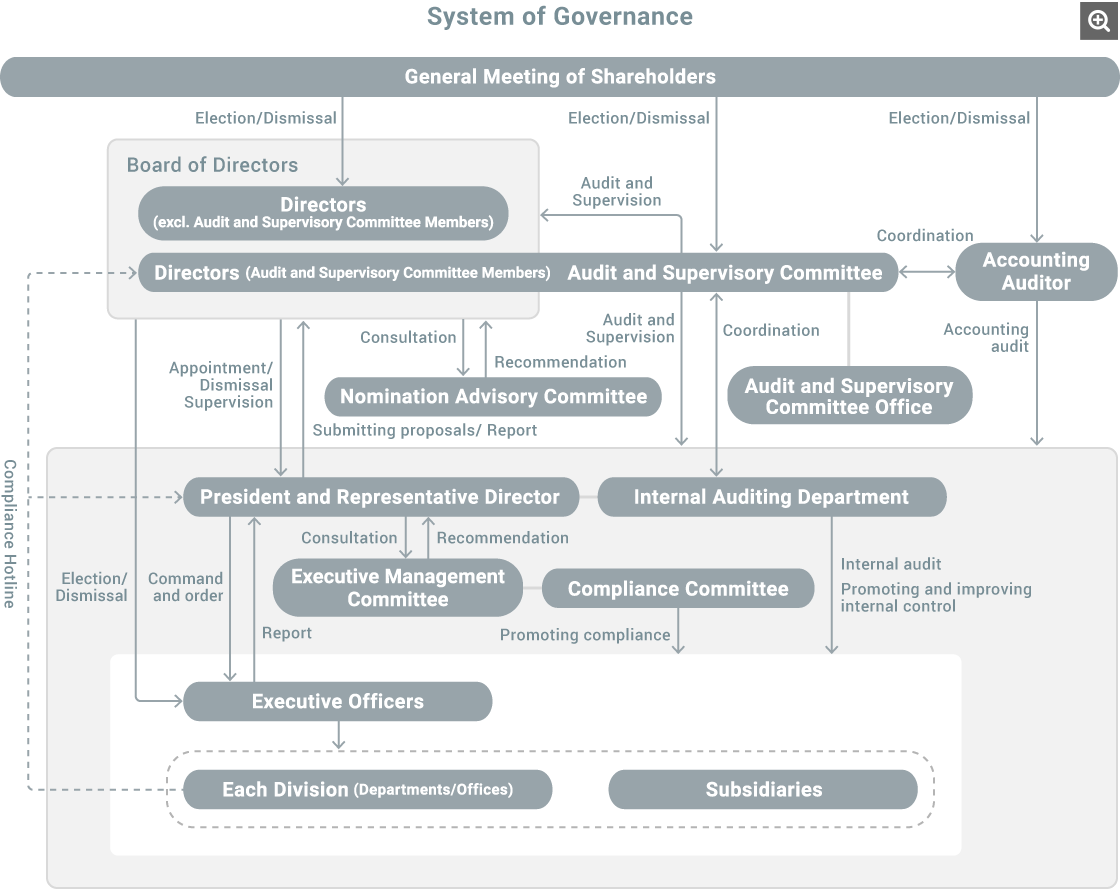Principles concerning corporate governance
At Nintendo, we strive to maximize long-term corporate value while carefully considering the benefits for everyone we touch. We are working to achieve a highly transparent and sound system of corporate governance; we also educate our employees about our policies, including good corporate ethics.
Outline of corporate governance system
For the purpose of strengthening the supervisory function of the Board of Directors, and further promoting corporate governance, Nintendo Co., Ltd. adopts the governance structure of a Company with Audit and Supervisory Committee.
Furthermore, the Company has introduced the Executive Officer System for the purpose of clarifying the responsibility for the execution of operations, and establishing a more flexible management structure which can appropriately and swiftly respond to the rapidly changing business environment. The foregoing will be enabled through separating the management decision-making and supervisory functions from the execution of operations as well as by accelerating the delegation of authority to execute operations.
The Board of Directors consists of thirteen Directors (including five who are Audit and Supervisory Committee Members), including six Outside Directors (including four who are Audit and Supervisory Committee Members). All the Outside Directors satisfy the standards for independent officers stipulated by Tokyo Stock Exchange, Inc.
To drive the management activities, in addition to the meetings of the Board of Directors held monthly as a general rule, meetings of the Executive Management Committee, which consists of Representative Directors and Directors who are Executive Officers, are held twice a month generally to make prompt and efficient decisions. Furthermore, Executive Officers appointed by the Board of Directors every year perform their respective duties under the President’s supervision and instructions.
Furthermore, as a non-mandatory advisory body to the Board of Directors, the Nomination Advisory Committee consisting of the President and Representative Director and all Directors serving on the Audit and Supervisory Committee deliberates on matters related to the nomination and compensation of Directors and reports to the Board of Directors.
The Audit and Supervisory Committee consists of one full-time Inside Corporate Director and four Outside Directors. The Audit and Supervisory Committee Members attend meetings of the Board of Directors and other important meetings, inspect important documents, have regular meetings with the President and hold monthly meetings of the Audit and Supervisory Committee as a general rule to share audit opinions.
Furthermore, the full-time Audit and Supervisory Committee Member conducts fieldwork auditing over each division of the Company, etc., based on the annual audit plan.
With respect to internal auditing, the Internal Auditing Department, under the direct supervision of the President, conducts internal auditing from a fair and unbiased perspective independent from business divisions, and works on the promotion and improvement of internal control including subsidiaries and associates.
Accounting Auditor maintains close coordination with the Audit and Supervisory Committee, as well as the Internal Auditing Department, regarding accounting auditing, including the report on the audit plan and audit results, as well as information and opinion exchanges as necessary even during the period, in order to ensure effective and efficient auditing.
Related Information
Corporate Governance Report (662KB) 2024.6.28
